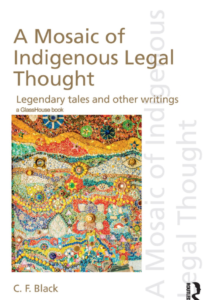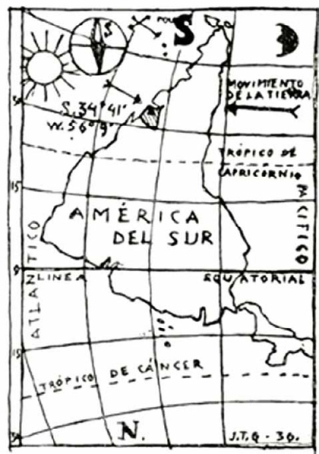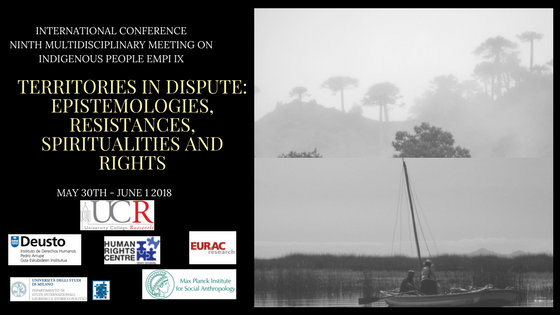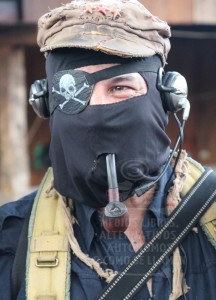Please note the south-south gathering to occur in Morocco on 30 June 2025. Proposals are due 31 December 2024. More info: https://redrisur.com/noticias/
Category Archives: Uncategorized
Call for Papers: Ninth Multidisciplinary Conference on Indigenous Peoples
Dear colleague, It’s a great pleasure to invite you to the Ninth Multidisciplinary Conference on Indigenous Peoples entitled “Territories in dispute: epistemologies, resistances, spiritualities and…
Christine Black: A Mosaic of Indigenous Legal Thought: Legendary Tales and Other Writings

capture
This book offers an Indigenous supplement to the rich and growing area of visual legal scholarship. Organized around three narratives, each with an associated politico-poetic reading, the book addresses three major global issues: climate change, the trade in human body parts and bio-policing. Manifesting and engaging the traditional storytelling mode of classical Indigenous ontology, these narratives convey legal and political knowledge, not merely through logical argument, but rather through the feelings o
Source: A Mosaic of Indigenous Legal Thought: Legendary Tales and Other Writings (Hardback) – Routledge
Southern Criminology
Researchers from Queensland University of Technology have recently applied a southern perspective to the administration of justice.
Issues of vital criminological research and policy significance abound in the global South, with important implications for South/North relations and for global security and justice. Having a theoretical framework capable of appreciating the significance of this global dynamic will contribute to criminology being able to better understand the challenges of the present and the future. We employ southern theory in a reflexive (and not a reductive) way to elucidate the power relations embedded in the hierarchal production of criminological knowledge that privileges theories, assumptions and methods based largely on empirical specificities of the global North. Our purpose is not to dismiss the conceptual and empirical advances in criminology, but to more usefully de-colonize and democratize the toolbox of available criminological concepts, theories and methods. As a way of illustrating how southern criminology might usefully contribute to better informed responses to global justice and security, this article examines three distinct projects that could be developed under such a rubric. These include, firstly, certain forms and patterns of crime specific to the global periphery; secondly, the distinctive patterns of gender and crime in the global south shaped by diverse cultural, social, religious and political factors and lastly the distinctive historical and contemporary penalities of the global south and their historical links with colonialism and empire building.
Source: Southern Criminology
CLACSO – VII Conferencia Latinoamericana Y Caribeña De Ciencias Sociales
An upcoming conference on 9-13 November 2015 in Medellín, Colombia focusing on social justice and peace in the region.
Source: CLACSO
The Studio at the Edge of the World
Design theorist Tony Fry has a new studio coming in Tasmania to pursue his concepts of sustainment, borderlands thinking and unsettlement.
The Studio has an interdisciplinary and international focus. It is a new kind of venture and centres on two areas of activity: the creation of learning events; and the development of a design think-tank in partnership with education institutions
Mapping Connections: Australia and Latin America
 Sarah Walsh will be convening a seminar with Dr Fernanda Peñaloza of the Spanish and Latin American Studies Department on 16-17 July 2015. Mapping Connections: Australia and Latin America will investigate affinities, connections, and tensions in the south-south axis between Australia and Latin America. Participants will explore how Latin America is imagined, created, and approached in the trajectories of Australian scholarship.Source: Mapping Connections | Race and Ethnicity in the Global South
Sarah Walsh will be convening a seminar with Dr Fernanda Peñaloza of the Spanish and Latin American Studies Department on 16-17 July 2015. Mapping Connections: Australia and Latin America will investigate affinities, connections, and tensions in the south-south axis between Australia and Latin America. Participants will explore how Latin America is imagined, created, and approached in the trajectories of Australian scholarship.Source: Mapping Connections | Race and Ethnicity in the Global South
Tribute: Professor Jonathan Ngarimu Mane-Wheoki
We acknowledge the passing of Professor Jonathan Mane-Wheoki, who made such as significant contribution to the establishment of art history from a Māori perspective.
Tribute: Professor Jonathan Ngarimu Mane-Wheoki | The Big Idea | Te Aria Nui.
Farewell, Subcomandante
Farewell, Subcomandante. The dramatic moment when the Zapatista leader Subcomandante ceased to exist.
Theories of the South: Limits and perspectives of an emergent movement in social sciences
Theories of the South: Limits and perspectives of an emergent movement in social sciences.
Brazilian sociologist Marcelo Rosa has published an important critique of social theory (download), comparing the approaches of Boaventura de Sousa Santos, Jean and John Comaroff and Raewyn Connell. Though he singles out Connell as an approach that allows for alternative southern voices, he concludes from their differing uses of theories an inconsistency in the notion of ‘southern theory’. In reference to the French sociologists Boltanski and Chiapello, he describes this use of south as a ‘circumstantial project’. As such, Rosa is vulnerable to the same critique he has levelled at others in marginalising southern perspectives by contrast to northern theory. Diversity of approaches does not necessarily imply contradictions in the field. They can indicate a dynamic argument that is activating an alternative field of inquiry.


